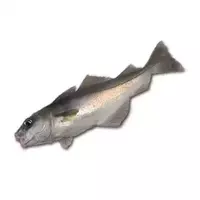Haddock fish

Haddock fish is a relative of cod, which also belongs to the northern marine species of fish. Haddock is considered a rather large fish - with an average length of 50-70 centimeters, its weight is from 2 to 3 kilograms. However, it happens that fishing nets come across specimens that differ in more significant dimensions - weighing about 15-19 kilograms with a length of one meter.
The body of haddock fish is somewhat flattened laterally and relatively high. The color of this fish is silver with a dark gray back with a lilac tint, light sides and a milky white belly. Just below the back, a horizontal black line runs along the torso of the haddock fish, with an oval dark speck observed on both sides near the head.
Currently, this northern fish is found in fresh, dried and smoked species, but most often haddock is sold frozen. Low-fat, white haddock fish meat has a very tender taste - it is valued quite highly as a dietary product. The calorie content of haddock is only 73 kcal per 100 grams.
Haddock fish is suitable for preparing a huge number of interesting dishes due to the fact that its delicate taste is perfectly combined with a variety of spices, many vegetables and spicy sauces. Elastic meat perfectly retains its attractive appearance and beneficial properties of haddock in any method of heat treatment. For example, steamed and boiled haddock has an unusually white layered fillet, ideal for the diet of people who want to lose weight.
Haddock fish retains its unusually soft taste in a toasted form, and its skin, which does not need to be cleaned at all, is pleasantly rustling. A beautiful golden hue can be achieved with a small number of breadcrumbs. In addition, haddock fish produces delicious cutlets, dumplings, pies, pates and salads. When smoked and salted, haddock acquires a particularly bright taste and rich aroma.
The benefits of haddock
The benefits of haddock for human health are obvious, because it is a natural source of vitamin V12, proteins and selenium. In addition, the meat of this fish is rich in potassium, pyridoxine, sodium, bromine, iron, iodine, fluorine and zinc, as well as vitamins A, groups B and D.
The benefits of haddock have been proven as a product with a high content of essential amino acids. The fat of this fish is known to include omega-3 polyunsaturated fatty acids alpha-linolenic and eicosapentaenoic. These substances have a beneficial effect on the functioning of the eyes and brain, help reduce the level of dangerous cholesterol in the blood, and also fight inflammatory processes in the human body.
haddock fish 73 kCal
Energy value of haddock fish (Ratio of proteins, fats, carbohydrates - ju):
Proteins: 17.2 (~ 69 kCal)
Fats: 0.5 g (~ 5 kCal)
Carbohydrates: 0 g (~ 0 kCal)
Energy ratio (b | y): 94% | 6% | 0%
 Español
Español Français
Français Português
Português Русский
Русский 简体中文
简体中文 繁體中文
繁體中文 日本語
日本語 한국어
한국어 العربية
العربية Türkçe
Türkçe Қазақ
Қазақ Deutsch
Deutsch Italiano
Italiano Українська
Українська
